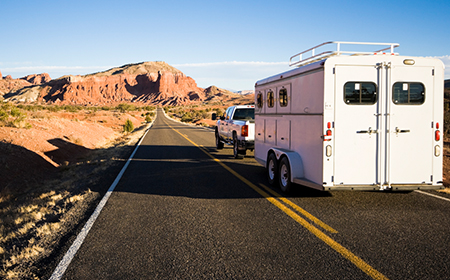Whether you haul a boat, your ATVs, a fifth wheel or a tent trailer, it's important to make sure your recreational trailer tires are in proper working condition. Proper tire inflation is essential to any trip going smoothly as well as keeping your gear in good condition. Under inflation of your tires causes unnecessary wear to your tires and can even cause a blow-out. Due to a trailer tire's stiff sidewall construction, it will not bulge out when your trailer tire is low on pressure like you see on a car tire. Therefore, it is important to check the PSI with a pressure gauge. The recommended inflation could be 40 PSI, but even at half of the recommended PSI, there would be no visual indication of a problem. The only way to accurately check your PSI is with a quality pressure gauge.
When you check your tire inflation, you should also do a visual inspection of the tread and sidewall. You are looking for foreign objects like screws or nails that may be caught in the tread, cracking, deep cuts, or bulges on the sidewall that may indicate a broken cord. Some bumps or indentations on the sidewall could be the result of a joint in the belts. This is perfectly normal on a radial tire, however if you have any concerns, you should have your tire inspected before heading out on a trip.
Something else to look for is an irregular wear pattern in the tread. If present, this may indicate a mechanical issue with the trailer itself, or an air pressure issue that is impacting the life of the tread. Finally, you want to ensure that there is a valve cap on every tire. These cost just a few dollars, but protect the tire valve from damage and is added protection against slow leaks through the valve itself.
To check the air pressure in your trailer tires, look for the PSI recommendation from the trailer manufacturer. The psi will be listed in your owner's manual for the trailer, or on a plaque on the trailer itself. The tire inflation recommendation is per the max load capacity of the trailer itself, not the amount written on the side of the tire. To be sure, you can always call the trailer manufacturer to find this information. Make sure you check your recreational trailer tires “cold” so either before you drive or at least three hours after you have driven. Then insert the pressure gauge into the valve stem of your tire. Once you have the reading, you'll know if your tire's psi is under or over the recommended amount, and you can act accordingly.
Another issue you may face with your trailer tires is oxidation. UV radiation can cause damage to your tires as they sit outside or on moist grass in non-use seasons. This can be resolved by using tire covers for your trailer tires when it's not in use. Another way to combat oxidation is to store your tires in a cool, dry place. While you can spot exterior damage on the sidewalls, it's more difficult to notice the damage done from pressurized air on the inside of the tire so it's important to take the preemptive steps to prevent oxidation from happening at all.
Even if you take the correct steps to maintain your tires, your tires will inevitably need to be replaced. According to rubber industry research, it is recommended that you replace your tires every 5 years, but tires typically last between 4 and 7 years depending on how you store your trailer. If your trailer comes with radial tires, the replacement tires must be radial. If your trailer has bias ply tires, you can replace them with bias-ply or radial tires, however radial and bias-ply tires should never be mixed on the same equipment.
